Assessing the Impact of WTO Rules on Environmental Protection
VerifiedAdded on 2023/02/01
|8
|1629
|32
Report
AI Summary
This report critically assesses the impact of World Trade Organization (WTO) rules on environmental protection, focusing on the constraints they impose on domestic environmental policies. The analysis delves into specific examples, such as the Shrimp-Turtle case and restrictions on environmental goods and services, to illustrate how WTO regulations can hinder environmental initiatives. It examines the limitations of the WTO in addressing environmental concerns, including the lack of a strong precautionary principle and the impact of trade barriers. The report also explores how WTO rules and jurisprudence could be reformed to better support environmental protection outcomes, with a focus on amending GATT Article XX and establishing supplementary bodies for environmental protection. The conclusion emphasizes the need for the WTO to adapt its articles to promote environmental sustainability in the face of global challenges like climate change. The report uses the Preamble of the Agreement Establishing the World Trade Organization as a guiding principle for its analysis.
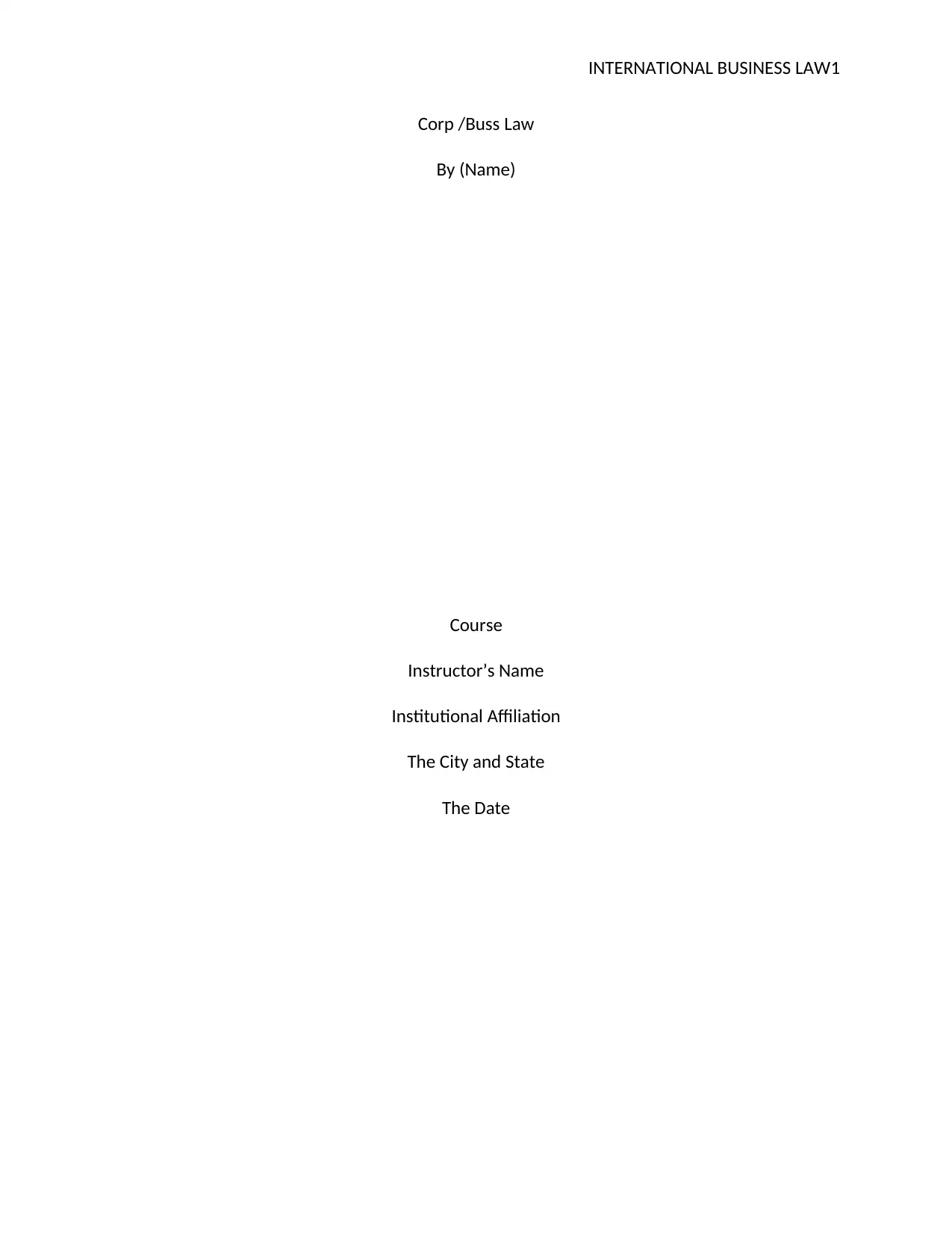
INTERNATIONAL BUSINESS LAW1
Corp /Buss Law
By (Name)
Course
Instructor’s Name
Institutional Affiliation
The City and State
The Date
Corp /Buss Law
By (Name)
Course
Instructor’s Name
Institutional Affiliation
The City and State
The Date
Paraphrase This Document
Need a fresh take? Get an instant paraphrase of this document with our AI Paraphraser
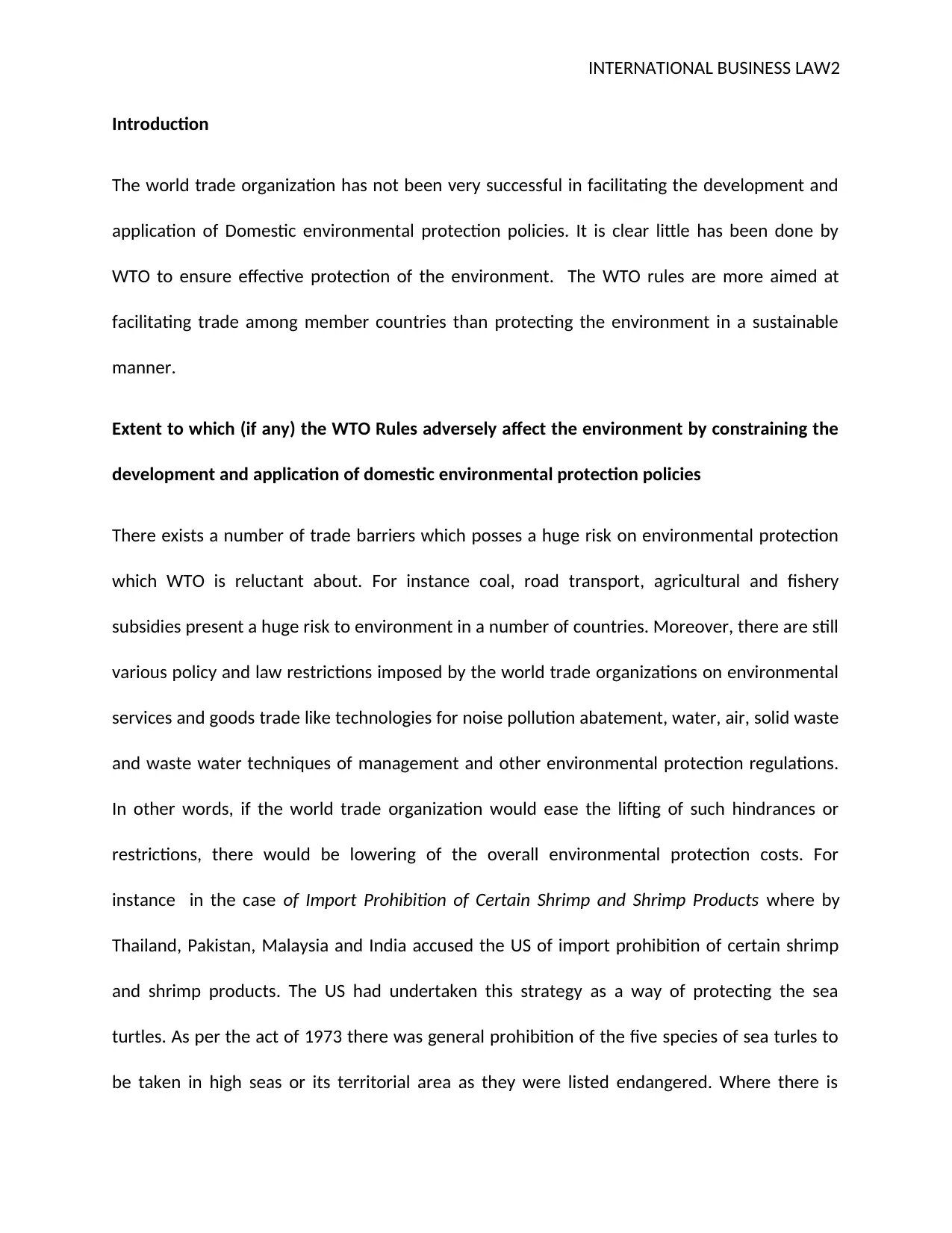
INTERNATIONAL BUSINESS LAW2
Introduction
The world trade organization has not been very successful in facilitating the development and
application of Domestic environmental protection policies. It is clear little has been done by
WTO to ensure effective protection of the environment. The WTO rules are more aimed at
facilitating trade among member countries than protecting the environment in a sustainable
manner.
Extent to which (if any) the WTO Rules adversely affect the environment by constraining the
development and application of domestic environmental protection policies
There exists a number of trade barriers which posses a huge risk on environmental protection
which WTO is reluctant about. For instance coal, road transport, agricultural and fishery
subsidies present a huge risk to environment in a number of countries. Moreover, there are still
various policy and law restrictions imposed by the world trade organizations on environmental
services and goods trade like technologies for noise pollution abatement, water, air, solid waste
and waste water techniques of management and other environmental protection regulations.
In other words, if the world trade organization would ease the lifting of such hindrances or
restrictions, there would be lowering of the overall environmental protection costs. For
instance in the case of Import Prohibition of Certain Shrimp and Shrimp Products where by
Thailand, Pakistan, Malaysia and India accused the US of import prohibition of certain shrimp
and shrimp products. The US had undertaken this strategy as a way of protecting the sea
turtles. As per the act of 1973 there was general prohibition of the five species of sea turles to
be taken in high seas or its territorial area as they were listed endangered. Where there is
Introduction
The world trade organization has not been very successful in facilitating the development and
application of Domestic environmental protection policies. It is clear little has been done by
WTO to ensure effective protection of the environment. The WTO rules are more aimed at
facilitating trade among member countries than protecting the environment in a sustainable
manner.
Extent to which (if any) the WTO Rules adversely affect the environment by constraining the
development and application of domestic environmental protection policies
There exists a number of trade barriers which posses a huge risk on environmental protection
which WTO is reluctant about. For instance coal, road transport, agricultural and fishery
subsidies present a huge risk to environment in a number of countries. Moreover, there are still
various policy and law restrictions imposed by the world trade organizations on environmental
services and goods trade like technologies for noise pollution abatement, water, air, solid waste
and waste water techniques of management and other environmental protection regulations.
In other words, if the world trade organization would ease the lifting of such hindrances or
restrictions, there would be lowering of the overall environmental protection costs. For
instance in the case of Import Prohibition of Certain Shrimp and Shrimp Products where by
Thailand, Pakistan, Malaysia and India accused the US of import prohibition of certain shrimp
and shrimp products. The US had undertaken this strategy as a way of protecting the sea
turtles. As per the act of 1973 there was general prohibition of the five species of sea turles to
be taken in high seas or its territorial area as they were listed endangered. Where there is
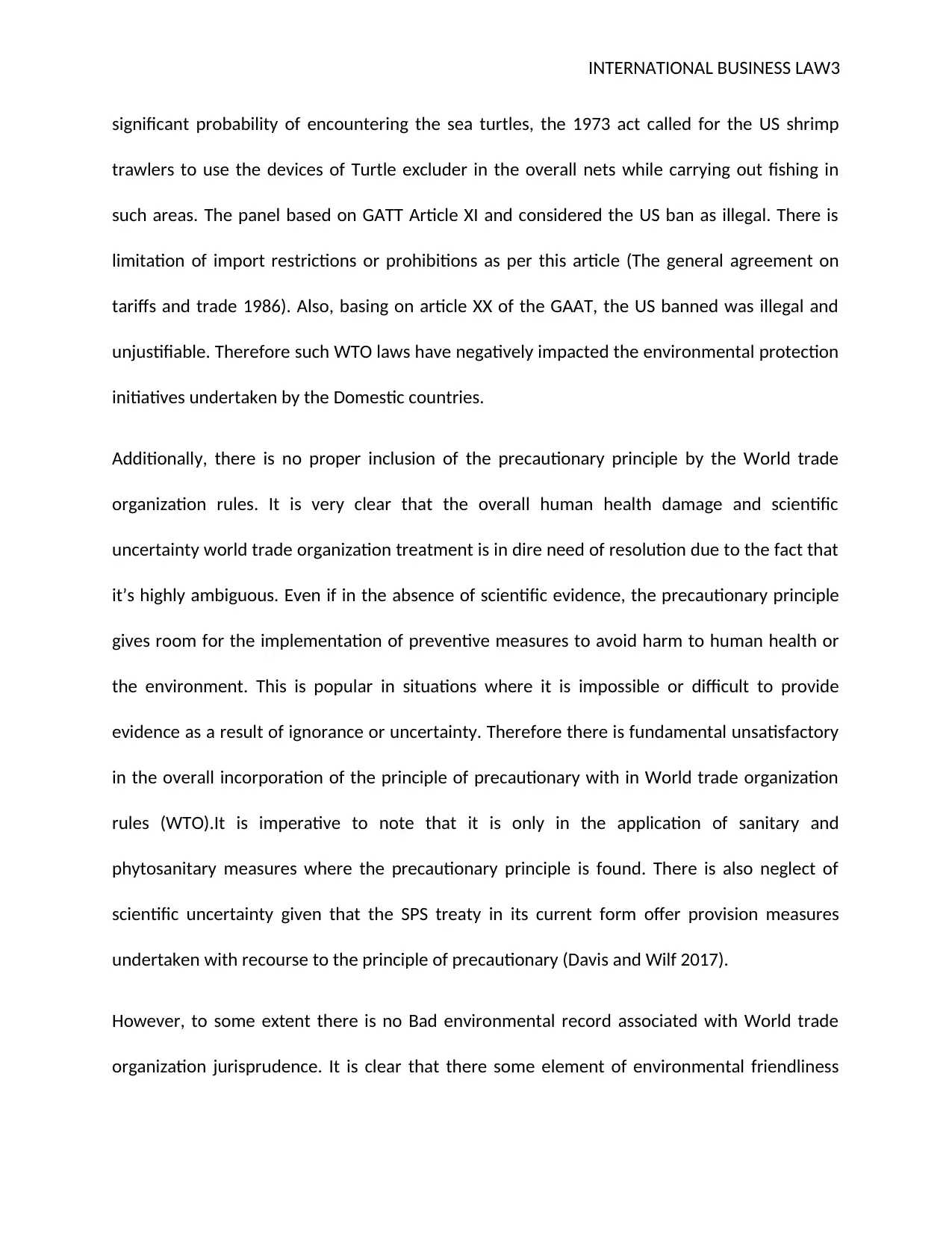
INTERNATIONAL BUSINESS LAW3
significant probability of encountering the sea turtles, the 1973 act called for the US shrimp
trawlers to use the devices of Turtle excluder in the overall nets while carrying out fishing in
such areas. The panel based on GATT Article XI and considered the US ban as illegal. There is
limitation of import restrictions or prohibitions as per this article (The general agreement on
tariffs and trade 1986). Also, basing on article XX of the GAAT, the US banned was illegal and
unjustifiable. Therefore such WTO laws have negatively impacted the environmental protection
initiatives undertaken by the Domestic countries.
Additionally, there is no proper inclusion of the precautionary principle by the World trade
organization rules. It is very clear that the overall human health damage and scientific
uncertainty world trade organization treatment is in dire need of resolution due to the fact that
it’s highly ambiguous. Even if in the absence of scientific evidence, the precautionary principle
gives room for the implementation of preventive measures to avoid harm to human health or
the environment. This is popular in situations where it is impossible or difficult to provide
evidence as a result of ignorance or uncertainty. Therefore there is fundamental unsatisfactory
in the overall incorporation of the principle of precautionary with in World trade organization
rules (WTO).It is imperative to note that it is only in the application of sanitary and
phytosanitary measures where the precautionary principle is found. There is also neglect of
scientific uncertainty given that the SPS treaty in its current form offer provision measures
undertaken with recourse to the principle of precautionary (Davis and Wilf 2017).
However, to some extent there is no Bad environmental record associated with World trade
organization jurisprudence. It is clear that there some element of environmental friendliness
significant probability of encountering the sea turtles, the 1973 act called for the US shrimp
trawlers to use the devices of Turtle excluder in the overall nets while carrying out fishing in
such areas. The panel based on GATT Article XI and considered the US ban as illegal. There is
limitation of import restrictions or prohibitions as per this article (The general agreement on
tariffs and trade 1986). Also, basing on article XX of the GAAT, the US banned was illegal and
unjustifiable. Therefore such WTO laws have negatively impacted the environmental protection
initiatives undertaken by the Domestic countries.
Additionally, there is no proper inclusion of the precautionary principle by the World trade
organization rules. It is very clear that the overall human health damage and scientific
uncertainty world trade organization treatment is in dire need of resolution due to the fact that
it’s highly ambiguous. Even if in the absence of scientific evidence, the precautionary principle
gives room for the implementation of preventive measures to avoid harm to human health or
the environment. This is popular in situations where it is impossible or difficult to provide
evidence as a result of ignorance or uncertainty. Therefore there is fundamental unsatisfactory
in the overall incorporation of the principle of precautionary with in World trade organization
rules (WTO).It is imperative to note that it is only in the application of sanitary and
phytosanitary measures where the precautionary principle is found. There is also neglect of
scientific uncertainty given that the SPS treaty in its current form offer provision measures
undertaken with recourse to the principle of precautionary (Davis and Wilf 2017).
However, to some extent there is no Bad environmental record associated with World trade
organization jurisprudence. It is clear that there some element of environmental friendliness
⊘ This is a preview!⊘
Do you want full access?
Subscribe today to unlock all pages.

Trusted by 1+ million students worldwide
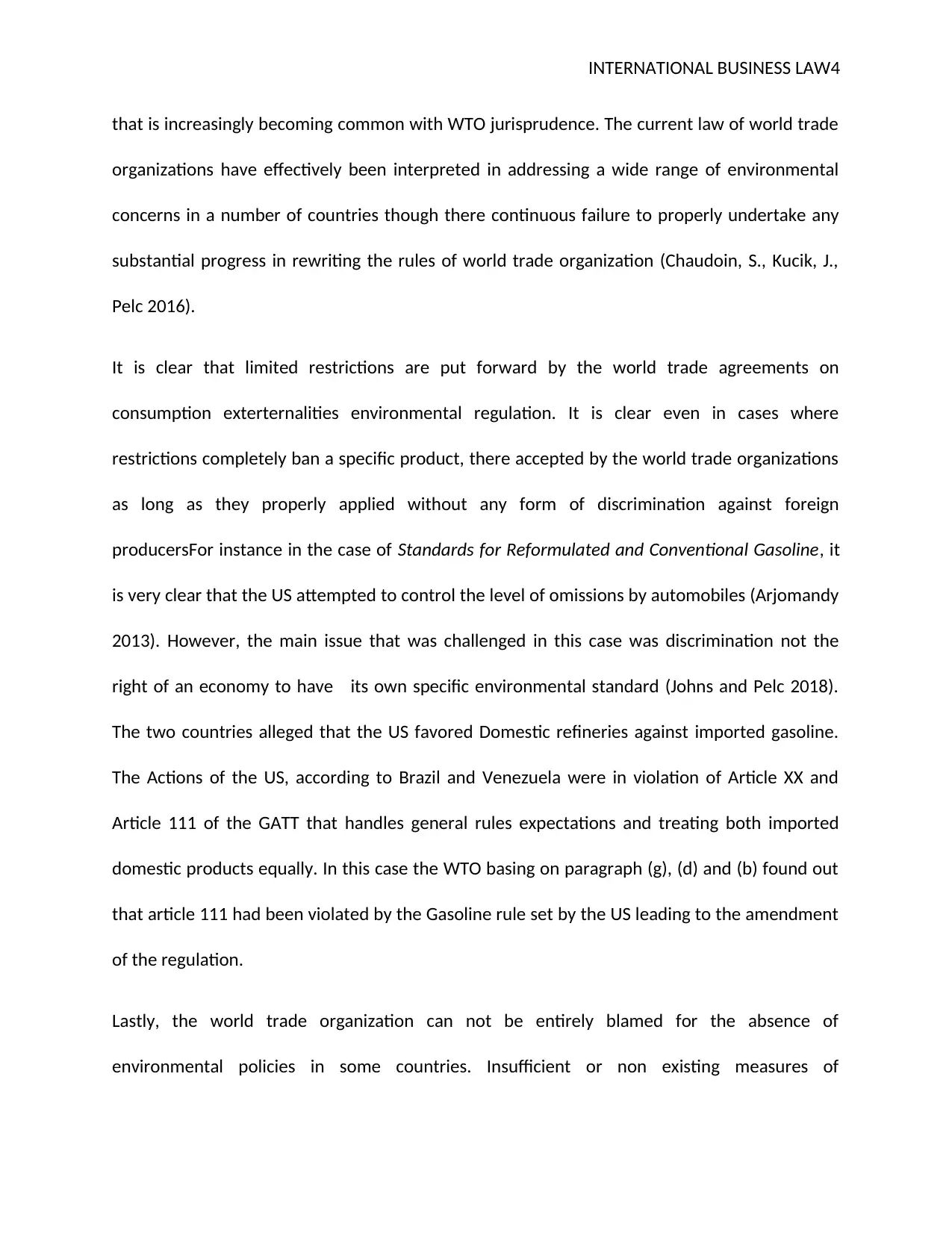
INTERNATIONAL BUSINESS LAW4
that is increasingly becoming common with WTO jurisprudence. The current law of world trade
organizations have effectively been interpreted in addressing a wide range of environmental
concerns in a number of countries though there continuous failure to properly undertake any
substantial progress in rewriting the rules of world trade organization (Chaudoin, S., Kucik, J.,
Pelc 2016).
It is clear that limited restrictions are put forward by the world trade agreements on
consumption exterternalities environmental regulation. It is clear even in cases where
restrictions completely ban a specific product, there accepted by the world trade organizations
as long as they properly applied without any form of discrimination against foreign
producersFor instance in the case of Standards for Reformulated and Conventional Gasoline, it
is very clear that the US attempted to control the level of omissions by automobiles (Arjomandy
2013). However, the main issue that was challenged in this case was discrimination not the
right of an economy to have its own specific environmental standard (Johns and Pelc 2018).
The two countries alleged that the US favored Domestic refineries against imported gasoline.
The Actions of the US, according to Brazil and Venezuela were in violation of Article XX and
Article 111 of the GATT that handles general rules expectations and treating both imported
domestic products equally. In this case the WTO basing on paragraph (g), (d) and (b) found out
that article 111 had been violated by the Gasoline rule set by the US leading to the amendment
of the regulation.
Lastly, the world trade organization can not be entirely blamed for the absence of
environmental policies in some countries. Insufficient or non existing measures of
that is increasingly becoming common with WTO jurisprudence. The current law of world trade
organizations have effectively been interpreted in addressing a wide range of environmental
concerns in a number of countries though there continuous failure to properly undertake any
substantial progress in rewriting the rules of world trade organization (Chaudoin, S., Kucik, J.,
Pelc 2016).
It is clear that limited restrictions are put forward by the world trade agreements on
consumption exterternalities environmental regulation. It is clear even in cases where
restrictions completely ban a specific product, there accepted by the world trade organizations
as long as they properly applied without any form of discrimination against foreign
producersFor instance in the case of Standards for Reformulated and Conventional Gasoline, it
is very clear that the US attempted to control the level of omissions by automobiles (Arjomandy
2013). However, the main issue that was challenged in this case was discrimination not the
right of an economy to have its own specific environmental standard (Johns and Pelc 2018).
The two countries alleged that the US favored Domestic refineries against imported gasoline.
The Actions of the US, according to Brazil and Venezuela were in violation of Article XX and
Article 111 of the GATT that handles general rules expectations and treating both imported
domestic products equally. In this case the WTO basing on paragraph (g), (d) and (b) found out
that article 111 had been violated by the Gasoline rule set by the US leading to the amendment
of the regulation.
Lastly, the world trade organization can not be entirely blamed for the absence of
environmental policies in some countries. Insufficient or non existing measures of
Paraphrase This Document
Need a fresh take? Get an instant paraphrase of this document with our AI Paraphraser
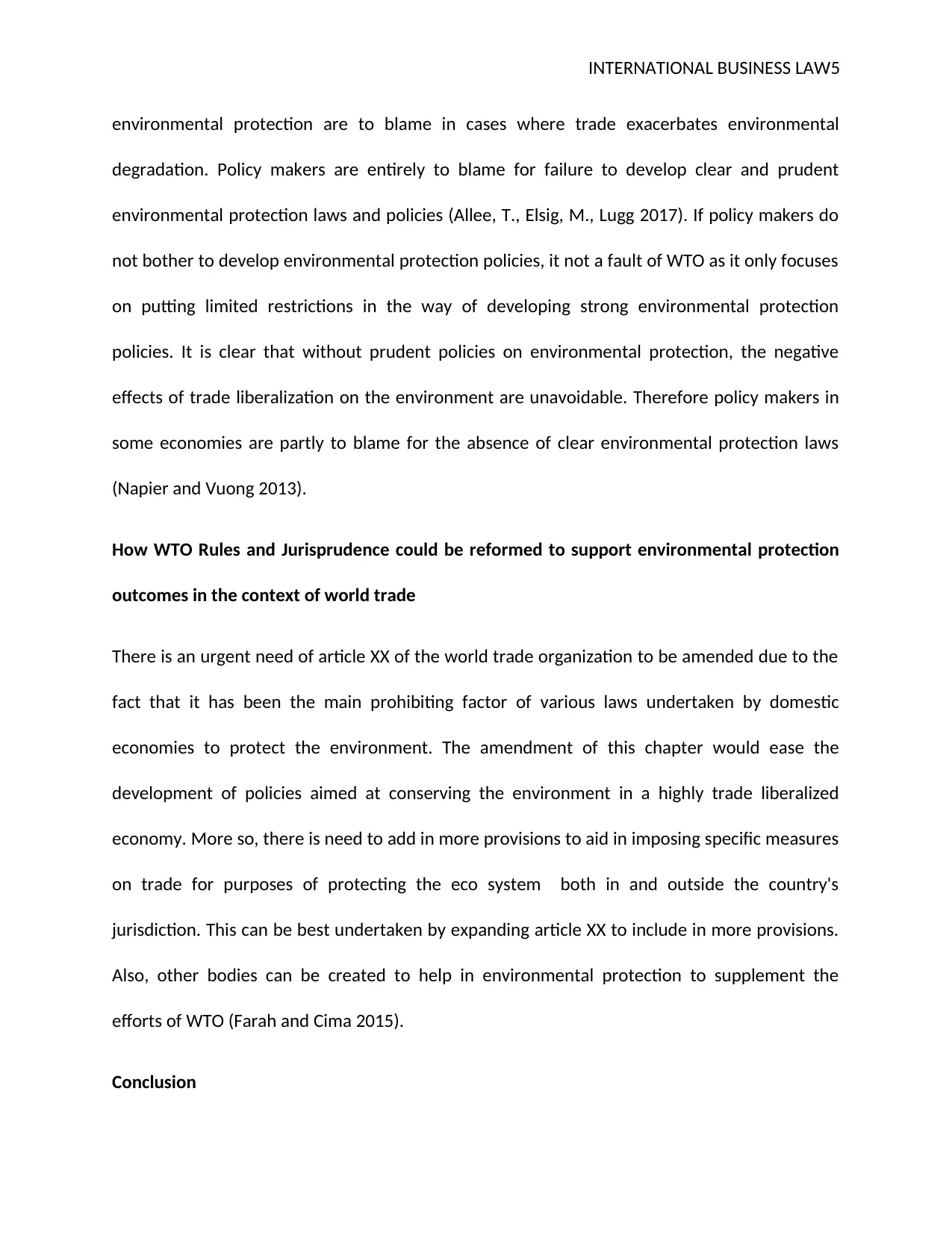
INTERNATIONAL BUSINESS LAW5
environmental protection are to blame in cases where trade exacerbates environmental
degradation. Policy makers are entirely to blame for failure to develop clear and prudent
environmental protection laws and policies (Allee, T., Elsig, M., Lugg 2017). If policy makers do
not bother to develop environmental protection policies, it not a fault of WTO as it only focuses
on putting limited restrictions in the way of developing strong environmental protection
policies. It is clear that without prudent policies on environmental protection, the negative
effects of trade liberalization on the environment are unavoidable. Therefore policy makers in
some economies are partly to blame for the absence of clear environmental protection laws
(Napier and Vuong 2013).
How WTO Rules and Jurisprudence could be reformed to support environmental protection
outcomes in the context of world trade
There is an urgent need of article XX of the world trade organization to be amended due to the
fact that it has been the main prohibiting factor of various laws undertaken by domestic
economies to protect the environment. The amendment of this chapter would ease the
development of policies aimed at conserving the environment in a highly trade liberalized
economy. More so, there is need to add in more provisions to aid in imposing specific measures
on trade for purposes of protecting the eco system both in and outside the country's
jurisdiction. This can be best undertaken by expanding article XX to include in more provisions.
Also, other bodies can be created to help in environmental protection to supplement the
efforts of WTO (Farah and Cima 2015).
Conclusion
environmental protection are to blame in cases where trade exacerbates environmental
degradation. Policy makers are entirely to blame for failure to develop clear and prudent
environmental protection laws and policies (Allee, T., Elsig, M., Lugg 2017). If policy makers do
not bother to develop environmental protection policies, it not a fault of WTO as it only focuses
on putting limited restrictions in the way of developing strong environmental protection
policies. It is clear that without prudent policies on environmental protection, the negative
effects of trade liberalization on the environment are unavoidable. Therefore policy makers in
some economies are partly to blame for the absence of clear environmental protection laws
(Napier and Vuong 2013).
How WTO Rules and Jurisprudence could be reformed to support environmental protection
outcomes in the context of world trade
There is an urgent need of article XX of the world trade organization to be amended due to the
fact that it has been the main prohibiting factor of various laws undertaken by domestic
economies to protect the environment. The amendment of this chapter would ease the
development of policies aimed at conserving the environment in a highly trade liberalized
economy. More so, there is need to add in more provisions to aid in imposing specific measures
on trade for purposes of protecting the eco system both in and outside the country's
jurisdiction. This can be best undertaken by expanding article XX to include in more provisions.
Also, other bodies can be created to help in environmental protection to supplement the
efforts of WTO (Farah and Cima 2015).
Conclusion
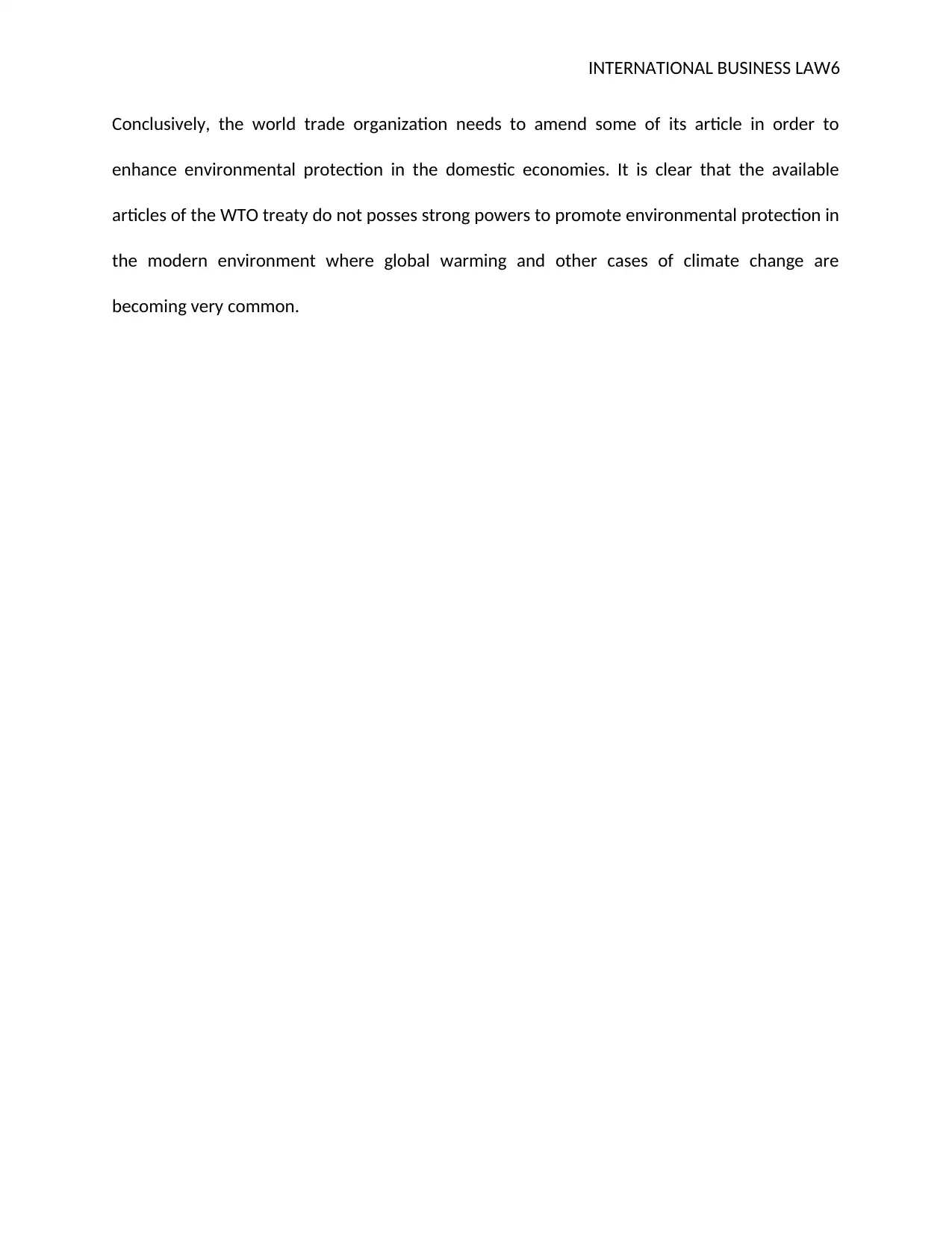
INTERNATIONAL BUSINESS LAW6
Conclusively, the world trade organization needs to amend some of its article in order to
enhance environmental protection in the domestic economies. It is clear that the available
articles of the WTO treaty do not posses strong powers to promote environmental protection in
the modern environment where global warming and other cases of climate change are
becoming very common.
Conclusively, the world trade organization needs to amend some of its article in order to
enhance environmental protection in the domestic economies. It is clear that the available
articles of the WTO treaty do not posses strong powers to promote environmental protection in
the modern environment where global warming and other cases of climate change are
becoming very common.
⊘ This is a preview!⊘
Do you want full access?
Subscribe today to unlock all pages.

Trusted by 1+ million students worldwide
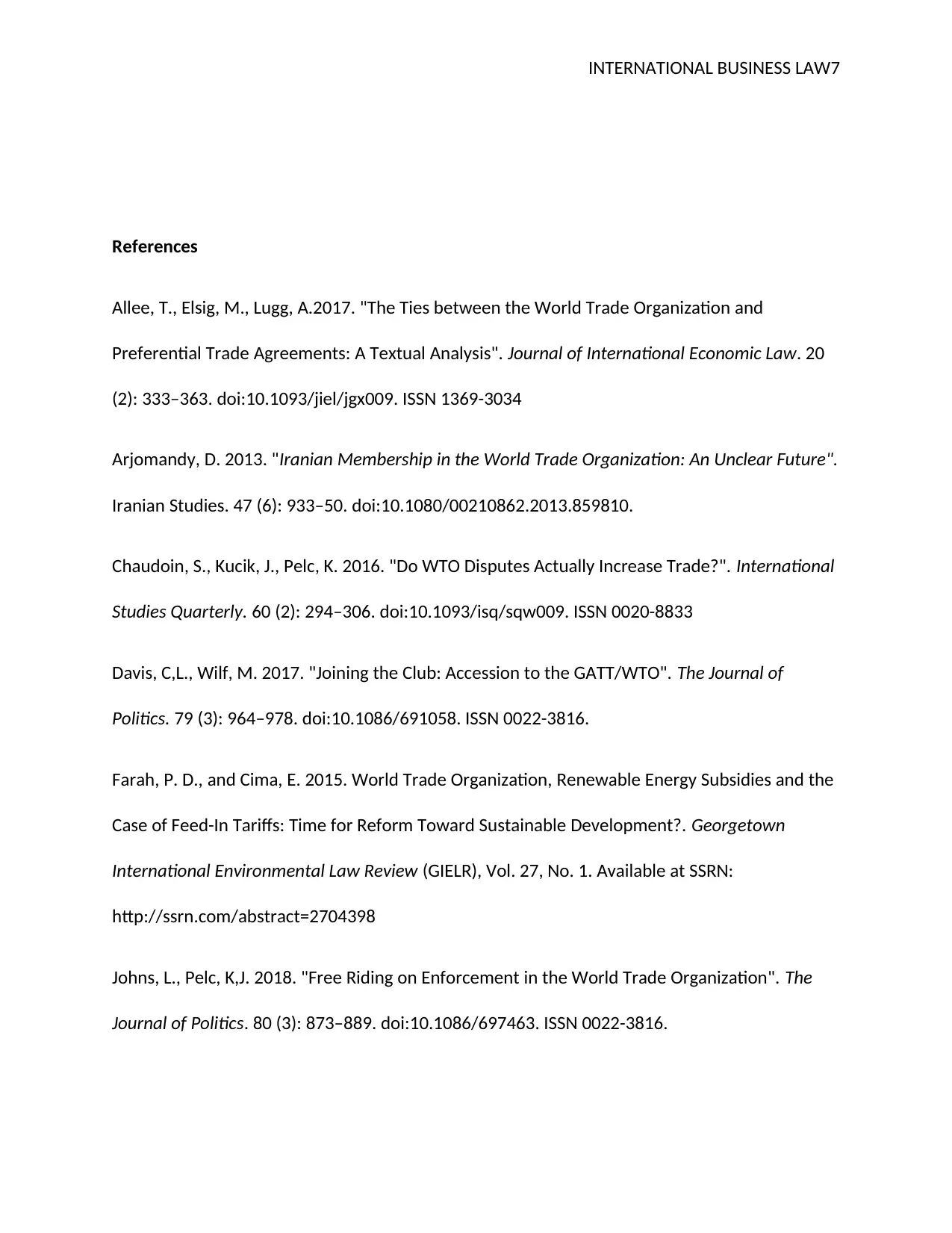
INTERNATIONAL BUSINESS LAW7
References
Allee, T., Elsig, M., Lugg, A.2017. "The Ties between the World Trade Organization and
Preferential Trade Agreements: A Textual Analysis". Journal of International Economic Law. 20
(2): 333–363. doi:10.1093/jiel/jgx009. ISSN 1369-3034
Arjomandy, D. 2013. "Iranian Membership in the World Trade Organization: An Unclear Future".
Iranian Studies. 47 (6): 933–50. doi:10.1080/00210862.2013.859810.
Chaudoin, S., Kucik, J., Pelc, K. 2016. "Do WTO Disputes Actually Increase Trade?". International
Studies Quarterly. 60 (2): 294–306. doi:10.1093/isq/sqw009. ISSN 0020-8833
Davis, C,L., Wilf, M. 2017. "Joining the Club: Accession to the GATT/WTO". The Journal of
Politics. 79 (3): 964–978. doi:10.1086/691058. ISSN 0022-3816.
Farah, P. D., and Cima, E. 2015. World Trade Organization, Renewable Energy Subsidies and the
Case of Feed-In Tariffs: Time for Reform Toward Sustainable Development?. Georgetown
International Environmental Law Review (GIELR), Vol. 27, No. 1. Available at SSRN:
http://ssrn.com/abstract=2704398
Johns, L., Pelc, K,J. 2018. "Free Riding on Enforcement in the World Trade Organization". The
Journal of Politics. 80 (3): 873–889. doi:10.1086/697463. ISSN 0022-3816.
References
Allee, T., Elsig, M., Lugg, A.2017. "The Ties between the World Trade Organization and
Preferential Trade Agreements: A Textual Analysis". Journal of International Economic Law. 20
(2): 333–363. doi:10.1093/jiel/jgx009. ISSN 1369-3034
Arjomandy, D. 2013. "Iranian Membership in the World Trade Organization: An Unclear Future".
Iranian Studies. 47 (6): 933–50. doi:10.1080/00210862.2013.859810.
Chaudoin, S., Kucik, J., Pelc, K. 2016. "Do WTO Disputes Actually Increase Trade?". International
Studies Quarterly. 60 (2): 294–306. doi:10.1093/isq/sqw009. ISSN 0020-8833
Davis, C,L., Wilf, M. 2017. "Joining the Club: Accession to the GATT/WTO". The Journal of
Politics. 79 (3): 964–978. doi:10.1086/691058. ISSN 0022-3816.
Farah, P. D., and Cima, E. 2015. World Trade Organization, Renewable Energy Subsidies and the
Case of Feed-In Tariffs: Time for Reform Toward Sustainable Development?. Georgetown
International Environmental Law Review (GIELR), Vol. 27, No. 1. Available at SSRN:
http://ssrn.com/abstract=2704398
Johns, L., Pelc, K,J. 2018. "Free Riding on Enforcement in the World Trade Organization". The
Journal of Politics. 80 (3): 873–889. doi:10.1086/697463. ISSN 0022-3816.
Paraphrase This Document
Need a fresh take? Get an instant paraphrase of this document with our AI Paraphraser
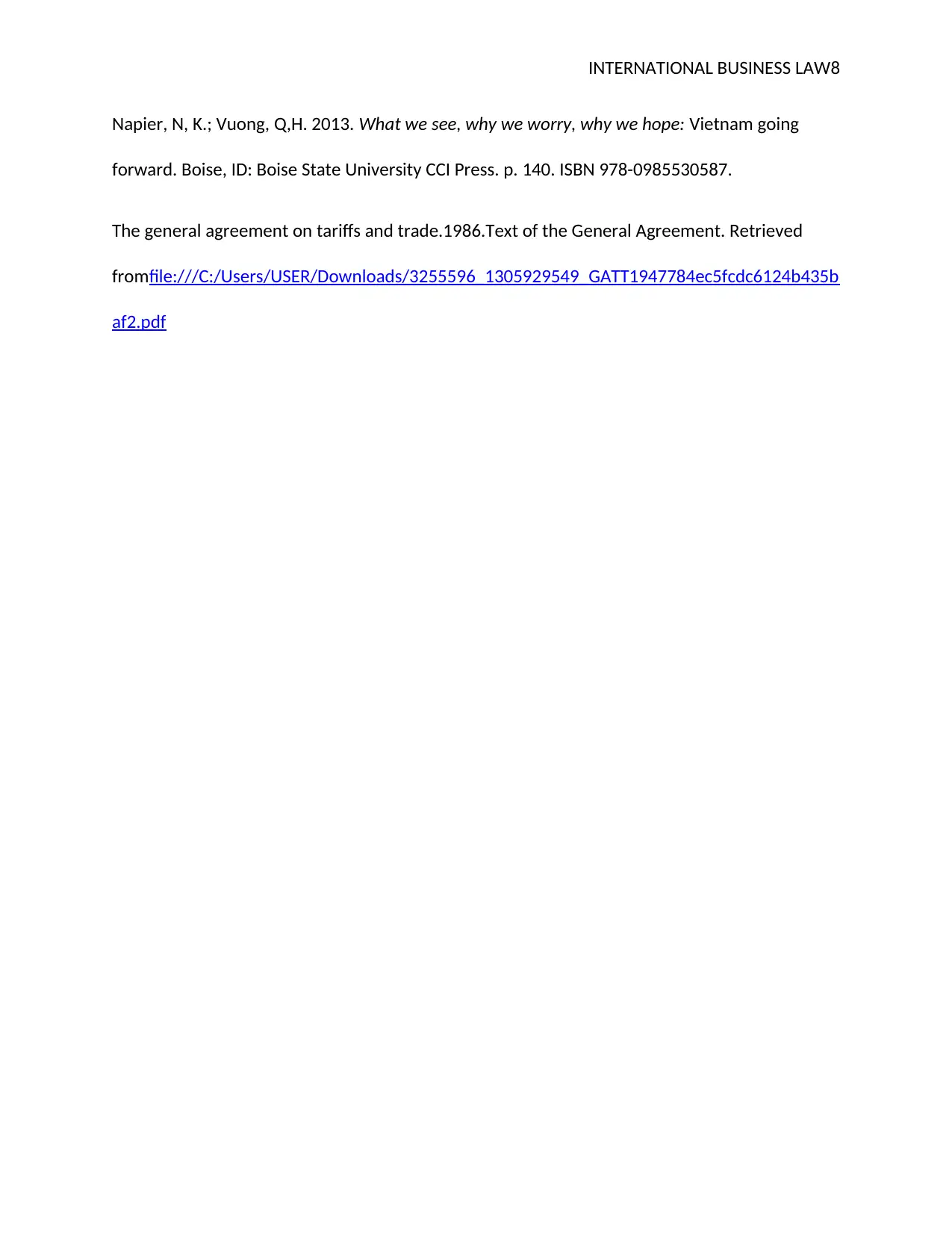
INTERNATIONAL BUSINESS LAW8
Napier, N, K.; Vuong, Q,H. 2013. What we see, why we worry, why we hope: Vietnam going
forward. Boise, ID: Boise State University CCI Press. p. 140. ISBN 978-0985530587.
The general agreement on tariffs and trade.1986.Text of the General Agreement. Retrieved
fromfile:///C:/Users/USER/Downloads/3255596_1305929549_GATT1947784ec5fcdc6124b435b
af2.pdf
Napier, N, K.; Vuong, Q,H. 2013. What we see, why we worry, why we hope: Vietnam going
forward. Boise, ID: Boise State University CCI Press. p. 140. ISBN 978-0985530587.
The general agreement on tariffs and trade.1986.Text of the General Agreement. Retrieved
fromfile:///C:/Users/USER/Downloads/3255596_1305929549_GATT1947784ec5fcdc6124b435b
af2.pdf
1 out of 8
Your All-in-One AI-Powered Toolkit for Academic Success.
+13062052269
info@desklib.com
Available 24*7 on WhatsApp / Email
![[object Object]](/_next/static/media/star-bottom.7253800d.svg)
Unlock your academic potential
Copyright © 2020–2026 A2Z Services. All Rights Reserved. Developed and managed by ZUCOL.

